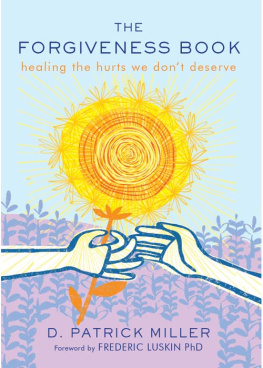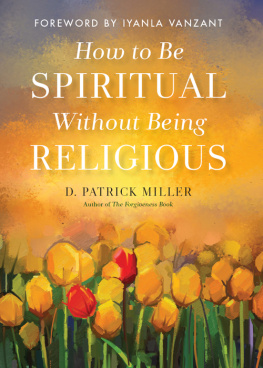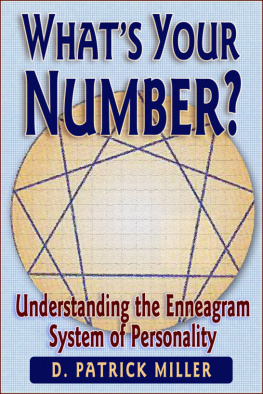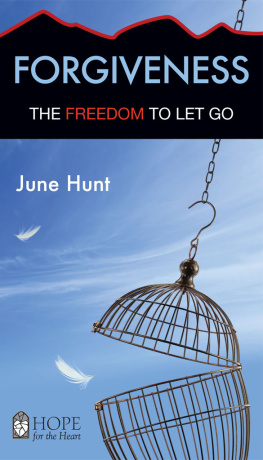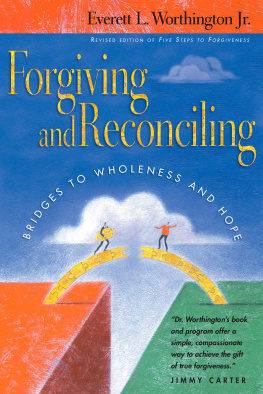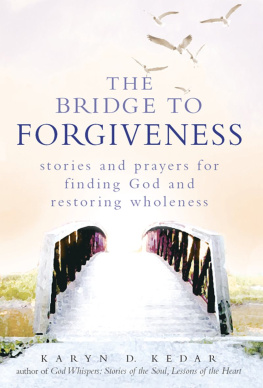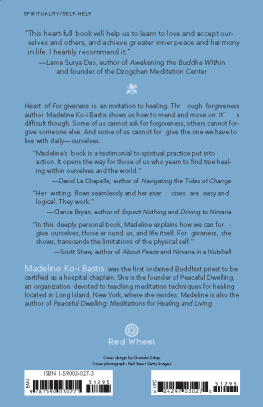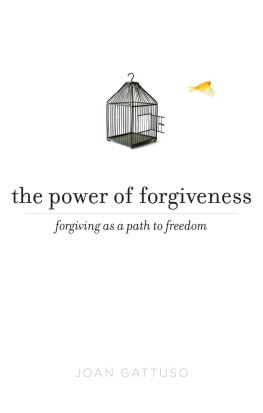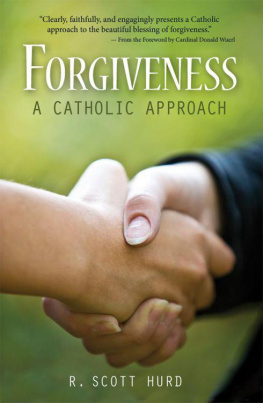

Copyright 2017
by D. Patrick Miller
All rights reserved. No part of this publication may be reproduced or transmitted in any form or by any means, electronic or mechanical, including photocopying, recording, or by any information storage and retrieval system, without permission in writing from Red Wheel/Weiser, LLC. Reviewers may quote brief passages. Previously published in 1994 as A Little Book of Forgiveness by Viking, ISBN 0670854069 and in 2009 as The Way of Forgiveness by Fearless Books, ISBN 978-09822799-0-8
Cover design by Jim Warner
Cover photograph Jing Jing Tsog/the ispot
Interior photos/images by Vecteezy and FreePik
Interior by Steve Amarillo/Urban Design LLC
Typeset in Monotype Centaur and Sackers Gothic
Hampton Roads Publishing Company, Inc.
Charlottesville, VA 22906
Distributed by Red Wheel/Weiser, LLC
www.redwheelweiser.com
Sign up for our newsletter and special offers by going to www.redwheelweiser.com/newsletter/.
ISBN: 978-1-57174-777-8
Library of Congress Cataloging-in-Publication Data available upon request
Printed in the United States of America
M&G
10 9 8 7 6 5 4 3 2 1
www.redwheelweiser.com
www.redwheelweiser.com/newsletter
TABLE OF CONTENTS

FOREWORD
W hen first published as A Little Book of Forgiveness in 1994, this was a book whose ideas and message were ahead of its time. At that time there were only one or two published scientific studies demonstrating the power of forgiveness to make a difference in the lives of people who forgave. In 1994 my own thinking about forgiveness was mostly latent; I was unsure of just how important forgiveness was to the well-being of body and mind. I would not attempt my first research project until the end of 1996, and even then my thinking was rudimentary and lacking in power.
I have directed the Stanford Forgiveness Projects for the past eighteen years. These are a series of research endeavors that helped substantiate the power of forgiveness to reduce hurt, depression, anger, and stress in people who hold grudges. In addition, the Forgiveness Projects have shown that forgiveness can reduce the physical manifestations of stress, reduce blood pressure in angry hypertensives, improve physical vitality, and improve one's compassion and optimism. The Projects have also shown that forgiveness is for everyone; we conducted research on hurt college students, angry and disappointed middle-aged adults, stressed-out business people, and people who have had family members murdered by political violence. In addition to this research, I have taught forgiveness to tens of thousands of hurt and angry people.
What I find fascinating is that the things I taught, researched, and proved to be true, D. Patrick Miller already knew. I am writing this foreword because of the remarkable degree of concordance this book has with the results of my research. The huge number of people I have worked with clinically demonstrates to me that the simple truths espoused in Mr. Miller's work are just that: simple truths.
One example of many is Mr. Miller's understanding of the power of gratitude. He writes this straightforward suggestion to establish the importance of this relationship: To accelerate forgiveness, practice gratefulness. Then he goes on to describe the power of gratitude in his own life and how that has improved his ability to forgive. In our forgiveness methodology and my self-help book Forgive for Good: A Proven Prescription for Health and Happiness, gratitude is a central concept. My experience has shown that the ability to feel gratitude is directly related to people's ability to forgive; grateful people seem to have an easier time letting go of their harsh judgments.
What I like about this book is that I can pick it up at any page and get an insight that is helpful in understanding and moving towards forgiveness. It does not matter where I begin or for what I am looking; each page resonates with some truth about the subject and is written in a gentle and inviting manner. It is clear that this book has emerged from personal experience and a depth of practice. Reading The Forgiveness Book will offer the reader a safe and guided passage into a practice that is essential for mental and physical well-being. As Mr. Miller highlights so movingly, the more of us who practice forgiveness, the more people who are available to heal both our world and ourselves.
Frederic Luskin, PhD
Author, Forgive for Good and Forgive for Love
Director, Stanford Forgiveness Projects
INTRODUCTION
I s there anything going on in your life that just wears you out? A thankless job, a chronic illness, a troubled relationship? Have you gone over and over this situation or circumstance without finding a solution or a way out?
When a problem resists solving, it's often because we have unknowingly limited the range of possible solutions. That happens because we have looked at the problem in the same way for a long time. Forgiveness begins with the willingness to look at any difficult circumstance of your life in a new way. Forgiveness is not about letting anyone off the hook for a mistake, insult, or crime. Nor is it about trying to forget something that bothers you. In fact, forgiveness may first require that you look more deeply at whatever is bothering you, because looking more deeply at something in particular will be the first step into seeing everything differently. And seeing everything differently is the way of forgiveness.
When this volume was first published as A Little Book of Forgiveness in 1994, there was indeed something little in the way that I approached my subject matter. While learning and practicing forgiveness had made a profound difference in my life, I was still a little worried about pushing the idea too hardas if it might be impolite to suggest too strongly that other people could benefit from giving up a grudge or changing a vengeful outlook. Less than a decade into my own spiritual discipline at the time, I was somewhat tentative about promoting all the advantages of it.
Fifteen years later, I decided to revise and re-title the book in light of the greater understanding of forgiveness that I had developed since. This is the sixth edition over twenty-three years, during which I've realized that far from being a little undertaking, forgiveness is a disciplined and increasingly joyful approach to seeing and being that amounts to a new way of life. Nowadays I have a much better idea of what that means than I used to. The way of forgiving certainly doesn't mean becoming weak or passive, or using forgiveness to avoid conflicts. It does mean increasing one's capacity to deal with challenging relationships and daunting circumstances, because less energy is wasted on pointless resentments and rehashing ancient injuries. Gradually, a habitually cynical state of mind can give way to a happier and more spontaneous response to the world.
Still, adopting forgiveness as a way of life does not mean becoming a saint who sees only the best in everyone. In fact, it may actually sharpen your perceptions of people's flaws and failings, including your own. But when you see these problems with compassion rather than judgment, your own strength is immeasurably increased. Over time, what once seemed like shortcomings in another, or yourself, may be seen merely as differences that need have little or no negative impact on you.
Next page
